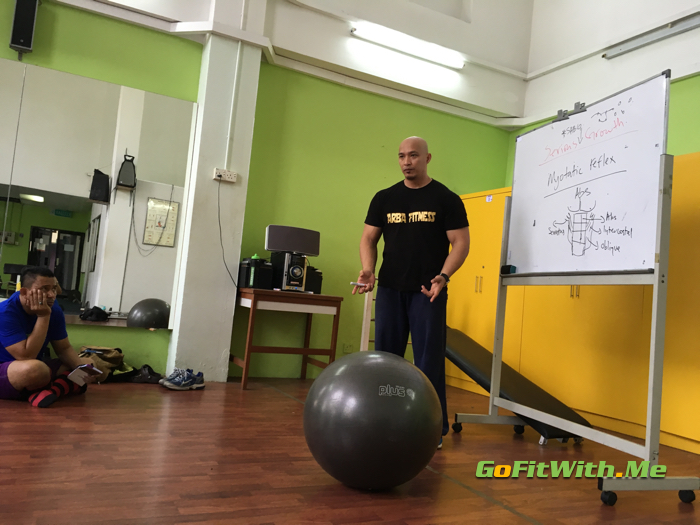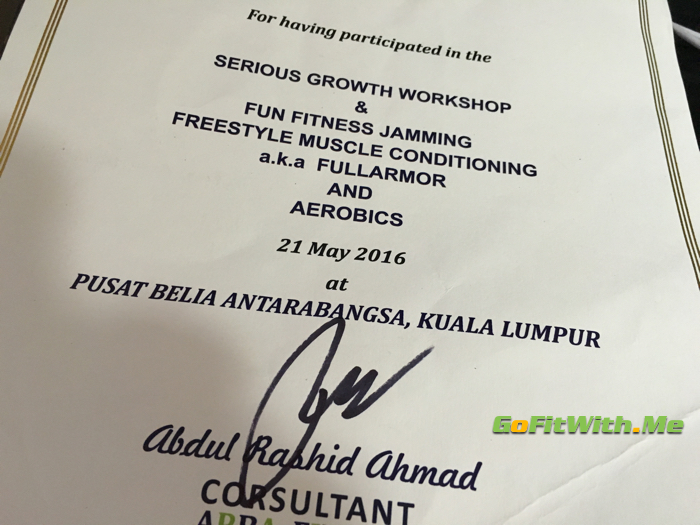Recently I’d attended gain weight workshop called “Serious Growth Workshop” held in International Youth Center, Kuala Lumpur. It was a fun experience and loaded with tips & information. Prior to the class most of us would have a mindset that to gain weight or muscle we need to hit the bar or hours of workout in the gym. What we discovered next was blowing our mind.
The instructor was conducted by Mr Abdul Rashid Ahmad and was in the fitness industry since he’s 18 years old. He’d experience in most of the muscle growth methods. He’d also competing in bodybuilding sport.

The class divided into two sessions, morning & afternoon. In the morning session, we was introduce to various theories of Nutrition. From the normal intake food till the use of drug. Yes, it’s drug. We need to know this to avoid being trapped into the drug alley. The other session focus on the right way of workout at home or at gym.
In the following paragraph, I’ll shared what we’d learned in the class.
Nutrition
This is the most important key point that Mr Rashid stressed on. It’s 80% Nutrition and 20% Exercise. Sound familiar? Yes, it’s the same as what we at GoFitWith.Me had been preached, practice and become our mantra.

Carbohydrate
Many people are confused about carbohydrates, but keep in mind that it’s more important to eat carbohydrates from healthy foods than to follow a strict diet limiting or counting the number of grams of carbohydrates consumed.
What’s most important is the type of carbohydrate you choose to eat because some sources are healthier than others. The amount of carbohydrate in the diet – high or low – is less important than the type of carbohydrate in the diet. For example, healthy, whole grains such as whole wheat bread, rye, barley and quinoa are better choices than highly refined white bread or French fries.
Carbo is associated with obesity and diabetes. If you opt to use low quality carbo with high glycemic index (GI), it will lead you to diabetes and other illness related to obesity such as hyper tension, heart attack, etc.
Foods high in carbohydrates are an important part of a healthy diet. Carbohydrates provide the body with glucose, which is converted to energy used to support bodily functions and physical activity. But carbohydrate quality is important; some types of carbohydrate-rich foods are better than others:
- The healthiest sources of carbohydrates—unprocessed or minimally processed whole grains, vegetables, fruits and beans—promote good health by delivering vitamins, minerals, fiber, and a host of important phytonutrients.
- Unhealthier sources of carbohydrates include white bread, pastries, sodas, and other highly processed or refined foods. These items contain easily digested carbohydrates that may contribute to weight gain, interfere with weight loss, and promote diabetes and heart disease.
Water
Maintaining water balance is essential for our survival.For this reason, evolution has provided us with intricate mechanisms for regulating when and how much we drink. When our total water content goes below a certain level, thirst kicks in. This is controlled by mechanisms similar to things like breathing … we don’t need to consciously think about it.

The health authorities commonly recommend eight 8-ounce glasses, which equals about 2 liters, or half a gallon. This is called the 8×8 rule and is very easy to remember.
Protein
The Recommended Dietary Allowances for adults aged 19-70 is 46 grams of protein for women and 56 grams of protein for men. Americans average about 15 percent of their calories from protein (or 75 grams in a 2,000-calorie diet).
According to Mr Rashid, our body require 1-2g protein per kg (of our body weight). You can adjust yourself.
Is all this protein good or bad? Frank Hu, a professor of nutrition and epidemiology at the Harvard School of Public Health, says that there is evidence that moderately high-protein diets help people lose weight, at least in the short term, and some studies have suggested they may lower heart disease risk.
“We should not only care about the amount of protein,” Hu says, “but the type of protein and the so-called ‘protein package.’” Red meat, dairy products, and eggs may have lots of protein but also have saturated fats. Beans, seeds, whole grains, nuts, and fish provide more beneficial nutrients along with protein, and are often less calorie-dense.
Emerging research shows that getting a little extra protein may be helpful at older ages, as a way to stave off muscle loss and frailty with aging. But again, Hu says, focusing on protein from plant-based foods is best. “If there’s too much protein and it comes from animal sources, it may have other health consequences,” he says.
Other Essential Nutrient
Among other food component that needed by our body is fat and vitamin.
Fat is an important part of a healthy diet. Choose foods with “good” unsaturated fats, limit foods high in saturated fat, and avoid “bad” trans fat.
- “Good” unsaturated fats — Monounsaturated and polyunsaturated fats — lower disease risk. Foods high in good fats include vegetable oils (such as olive, canola, sunflower, soy, and corn), nuts, seeds, and fish.
- “Bad” fats — trans fats — increase disease risk, even when eaten in small quantities. Foods containing trans fats are primarily in processed foods made with trans fat from partially hydrogenated oil. Fortunately, trans fats have been eliminated from many of these foods.
- Saturated fats, while not as harmful as trans fats, by comparison with unsaturated fats negatively impact health and are best consumed in moderation. Foods containing large amounts of saturated fat include red meat, butter, cheese, and ice cream.
- When you cut back on foods like red meat and butter, replace them with fish, beans, nuts, and healthy oils instead of refined carbohydrates.
For vitamin, your’ll find it naturally in vegetables and fruits. Our morning sun also a good source of Vitamin-D.
Quite surprise right? Most of us might expect the article will focus more on consuming “body builder” kind of supplement to gain weight. Instead, you’re reading what you might knew about it before – Carbo, protein, water, fat and vitamin.
You’ll notice the key is to get healthy and balance source of food.

Within this topic (Gain Weight), I’ll cover more on meal plan and workout in the other article.
Go Fit, Go Healthier and More Deeds.


